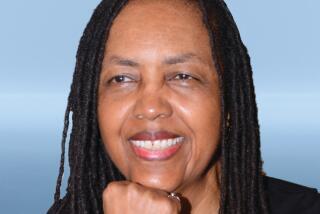NAACP’s retooled mission
- Share via
When the NAACP was founded in 1909, the injustice it aimed to battle was clear:
Black Americans were being lynched, denied the right to vote, restricted to ghettos, banned from schools and barred by legal segregation from public places — restaurants, theaters, swimming pools.
Today, with a black man in the White House, you could argue, and some people have, that the NAACP has become a relic of a less enlightened past; an anachronism in the era of Oprah, Barack Obama and a thriving black middle class.
But don’t tell that to the 5,000 folks who came to Los Angeles this week for the 102nd national convention of the National Assn. for the Advancement of Colored People.
With a young intellectual at the helm, the civil rights group is remaking itself — acknowledging the challenge of rising expectations and of obstacles to continued success.
The convention, as tradition dictates, was part church service, pep rally and political forum. But the influence of NAACP President Benjamin Jealous could be seen in the young people crowding the conference hall, tracking goings-on with the NAACP app downloaded to their smartphones.
Protest marches and boycotts are giving way to Twitter feeds. And there seemed to be less talk about racism and more about responsibility.
If the watchwords for the last century were integration and equality, the evolving NAACP is focusing on universal human rights and issues that keep people in poverty.
::
The convention coincided with the release of a Pew Research Center study that documents how much remains to be solved.
The recent recession hit black communities hardest, undoing years of economic growth and magnifying the instability that results from generations of playing catch-up.
Census data show the gap between the wealth of whites and blacks doubled between 2005 and 2009. Wealth is the accumulated sum of assets — homes, cars, savings, stocks — minus debts. The median wealth of white families is now 20 times that of blacks. The lopsided ratio is the largest in the 25 years the government has been keeping track.
The force of the economic crisis — high unemployment, home foreclosures, businesses losses and growing debt — sent the net worth of black households plunging to a level not seen since 1984. More than one-third of black households now have zero net worth, and one-quarter have no assets, other than a vehicle.
That can’t be solved with a protest march.
It requires an agenda that includes suing lenders who exploit struggling families with risky loans; supporting labor movement efforts to sustain income and jobs; and backing legislation that protects access to medical care and financial aid for college.
And it means grassroots efforts to educate residents and engage communities. That’s why the NAACP now offers financial education programs that teach local residents to rebuild their credit, save for college and retirement, and borrow responsibly.
And why its campaign against obesity doesn’t mean picketing McDonald’s, but teaching families to eat sensibly.
::
The NAACP members I talked to this week still see themselves as freedom fighters, even if the battle has shifted from demanding a seat at the lunch counter to fighting for more black faces on TV.
The black community is at a crossroads — shrinking in size, growing in diversity, no longer willing to be tethered to victim status.
The NAACP may be caught in a time warp — labeled extremist by its opponents yet dismissed as irrelevant even by some supporters.
I asked Jealous how the group plans to navigate the changing landscape of a multiethnic nation, where blacks are becoming a minority among minorities.
Where I saw potential conflicts, he sees opportunities. “If you follow a few basic sets of principles — inclusion, nondiscrimination, universal access to basic civil rights — it’s pretty easy to negotiate issues that might seem to reflect contrary interests and needs,” he said.
That means not blaming immigrant workers for depressing wages or taking jobs that traditionally “belonged” to blacks. “Our issue is with the employers,” he said. “We didn’t fight to stop our own oppression to turn around and tolerate that being done to someone else.”
It means breaking ranks sometimes with old allies — standing with the teachers union in New York to block the shift of resources to charter schools but against the union in Rhode Island, to back the firing of teachers at failing schools.
And it means challenging home-grown tradition — urging conservative black churches to embrace gays, lesbians and transgender folks, and acknowledge the crisis of HIV.
“What you’re seeing,” Jealous told me, “is a rising generation that’s more comfortable about recognizing differences and more intentional about being inclusive.”
Jealous is part of that generation. At 38, he was the youngest president in the group’s history when he was hired three years ago. His appointment was controversial. He doesn’t fit the preacher-or-politician mold. A graduate of Columbia and a Rhodes Scholar, he earned his activist stripes working for Amnesty International.
He grew up middle class in Northern California. His mother is black, a descendant of slaves, who helped desegregate her Maryland high school. His father is a white New Englander, with a family history of activism that dates to the American Revolution.
“I grew up with the expectation that we would invest our time in making our community stronger and more just,” Jealous said. “My childhood was very much a metaphor for the politics of this moment.”
He has already helped make the NAACP stronger, tapping foundations and corporate donors to rebuild a budget that operated in the red for years. Membership is growing, particularly among 18- to 25-year-olds. And online supporters — people willing to go beyond clicking “Like” on Facebook — have grown to more than half a million.
That has made the group harder to ignore on Capitol Hill, and more nimble in organizing at the local level.
“We didn’t win our freedom, we won the freedom to be free,” Jealous said, paraphrasing what Nelson Mandela said about South Africans. “Freedom requires you manage your finances properly, conduct your life in a way that keeps you on the right side of the law, start your career in a way that gives you options in your life.”
More to Read
Sign up for Essential California
The most important California stories and recommendations in your inbox every morning.
You may occasionally receive promotional content from the Los Angeles Times.










